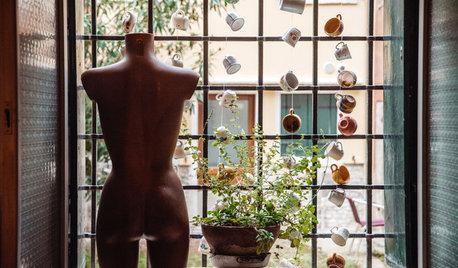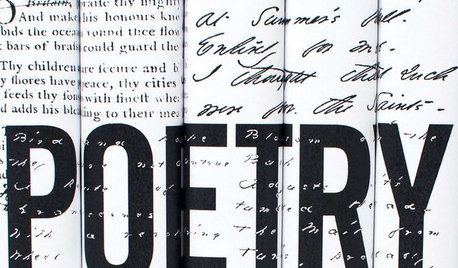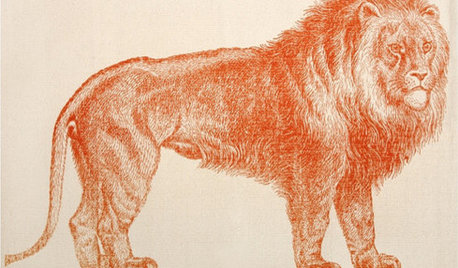Do you like "serious poetry"?
dublinbay z6 (KS)
11 years ago
Related Stories

HOMES AROUND THE WORLDMy Houzz: In Italy, a Kind of Design Poetry Amid Books and Mannequins
This Venetian writer-professor’s apartment is its own magical universe of objects, creativity and memories
Full Story
SHOP HOUZZShop Houzz: A Passion for Poetry
Decorate your home with accent pieces inspired by classic literature
Full Story0

HOUZZ TOURSMy Houzz: Poetry Romances a Montreal Live-Work Home
Love notes, quotations and lines from poems bring an enchanting air to the home and storefront of a Canadian furniture maker
Full Story
KITCHEN DESIGNKitchen of the Week: Elegant Updates for a Serious Cook
High-end appliances and finishes, and a more open layout, give a home chef in California everything she needs
Full Story
DECORATING GUIDESDream Spaces: 5 Seriously Glamorous Homes
Luxe textiles and reflective pieces add excitement to contemporary interiors
Full Story
HOMES AROUND THE WORLDWorld of Design: 11 Book Lovers and Where They Like to Read
Bibliophiles across the globe reveal their top books and favorite reading spots, from a 2-story library to an artfully curated book nook
Full Story
ACCESSORIESMake Things Magical With Paper Lanterns
Set some poetry in motion with affordable Asian-style paper lanterns that enchant as everyday or party decor
Full Story
PRODUCT PICKSGuest Picks: In Like a Lion, Out Like a Lamb
Take a cue from the classic adage about March with home accessories that call these animals to mind
Full Story
MODERN HOMESHouzz Tour: Monopoly House Leaves Nothing to Chance
It may look like a playing piece, but this home in Indiana was designed to offer serious utility for its owners and their grown children
Full Story



Rudebekia
friedag
Related Discussions
Do You Like Fried Potatoes and How do You Like Them
Q
Do you have 2-in-1 cellular shades? Do you like them?
Q
Where do you eat your meals and why do you like to eat there?
Q
Do you like Kilim rugs? I do. Will you help me choose?
Q
veer
dublinbay z6 (KS)Original Author
Rudebekia
friedag
woodnymph2_gw
Rudebekia
dublinbay z6 (KS)Original Author
woodnymph2_gw
frances_md
friedag
Sarah79
J C
Rudebekia
Rudebekia
friedag
veer
dublinbay z6 (KS)Original Author
friedag
veer
Kath
dublinbay z6 (KS)Original Author
woodnymph2_gw
friedag
dublinbay z6 (KS)Original Author
woodnymph2_gw
woodnymph2_gw
woodnymph2_gw
friedag
dublinbay z6 (KS)Original Author
woodnymph2_gw
dublinbay z6 (KS)Original Author